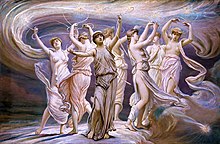| Celaeno | |
|---|---|
| The Boeotian Pleiad Nymph | |
| Member of the Pleiades | |
 The Pleiades by Elihu Vedder The Pleiades by Elihu Vedder | |
| Abode | Mt. Cyllene on Arcadia, later Mt. Cithaeron in Boeotia |
| Genealogy | |
| Parents | Atlas and Pleione or Aethra |
| Siblings |
(a) Pleiades
(b) Hyades
|
| Consort | (i) & (ii) Poseidon (iii) Prometheus |
| Children | (i) Lycus and Nycteus or (ii) Lycus (or Lycaon) and Eurypylus (or Eurytus) (iii) Lycus and Chimaerus |
In Greek mythology, Celaeno (/sɪˈliːnoʊ/; Ancient Greek: Κελαινώ Kelaino, lit. 'the dark one', also Celeno or Kelaino, sometimes Calaeno) was one of the Pleiades.
| Greek deities series |
|---|
| Nymphs |
Mythology
Celaeno was the daughter of Atlas and Pleione or Aethra. She was said to bore to Poseidon numerous children which includes: Lycus and Nycteus; of King Eurypylus (or Eurytus) of Cyrene, and Lycaon.
Modern references
The following modern uses derive from the Ancient Greek mythical name:
- Celaeno, a star in the Pleiades open cluster of stars.
- USS Celeno (AK-76), a United States Navy Crater class cargo ship
- Ship Celaeno builder A. HALL & Co Aberdeen. Rig: SHIP. Construction: Wood. Yard Number: 233. Completed in June 1863. Weighed 702 tons and measured 173.0 feet x 30.2 feet x 18.7 feet. The Celaeno made eleven trips to New Zealand.
In popular culture
- The star Celaeno features as a location in the Cthulhu Mythos stories of August Derleth. See Cthulhu Mythos celestial bodies and Extraterrestrial places in the Cthulhu Mythos
- Celaeno is the name of the chief Goddess in the Celaeno Series by Jane Fletcher.
- Celaeno (CeCe) is the main character of book 4 (The Pearl Sister) in the Seven Sisters series by Lucinda Riley
Notes
- Apollodorus, 3.10.1
- Scholia on Apollonius Rhodius, Argonautica 4.1561
References
- Apollodorus, The Library with an English Translation by Sir James George Frazer, F.B.A., F.R.S. in 2 Volumes, Cambridge, MA, Harvard University Press; London, William Heinemann Ltd. 1921. Online version at the Perseus Digital Library. Greek text available from the same website.
This article relating to Greek mythology is a stub. You can help Misplaced Pages by expanding it. |